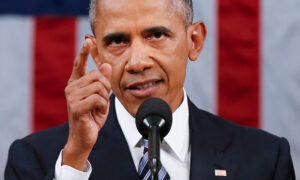Last night’s presidential debate was described as “the most consequential presidential debate in modern American history” so many times that no one bothered to ask just why that was so. For one thing, it could only be described as consequential once it had been proven to have profound consequences. But it hadn’t taken place yet. For another, it wasn’t clear what exactly the consequences were going to be. The country is not on the verge of civil war over the question of slavery, which was the urgent question that hung over the legendary senatorial debates between Abraham Lincoln and Stephen Douglas in 1858, attended by tens of thousands of people. Nor is the country seemingly teetering on the edge of a race war, as it was during the 1964 election between Lyndon Johnson and Barry Goldwater (Johnson, a weak debater with a giant lead in the polls, refused to debate Goldwater).
There has been a lot of talk about imminent civil war in America, and the internet sizzles with violent discord. It’s true that whichever side wins, the other side will feel either cheated or bereft, and feelings will run high. But neither candidate stands for anything ideologically galvanising. Kamala Harris tries to be nice. Donald Trump strives for an intimidating autocratic effect, but he lacks a cohesive vision, of the sort you might find in Mein Kampf or in Mussolini’s fiery speeches, a vision that would impel millions towards self-immolation for the sake of an idea. His formerly sharp demagogic instincts running on empty, Trump seemed at least to grasp the need to fill an urgent ideological need as he desperately sought last night to get the country worked up over what he claimed was undocumented immigrants eating the pets of American citizens in Springfield, Ohio. But immigrants feasting on cats and dogs would be a poor centrepiece of, say, imperialism or antisemitism; it does not an origin of totalitarianism make. Instead, the unhinged quality of Trump’s groundless claim might well have lost him the election.
Gravely serious matters were at stake at the debate: abortion, immigration, the rule of law. But America has adapted and will adapt to permutations in policy for the first two, and the country is too stable for Trump’s most virulent autocratic fantasies to become reality. No one as obsessed with the bottom financial line as Trump is would ever risk creating anything more than rhetorical chaos. Business people hate real chaos. And unlike the Chicken Littles of the liberal media, they know fantastical bluster when they see it.
Still, after the uncertain first few minutes of the debate, the mysterious air of profound consequentiality intensified. The expectation, of course, was that a live debate without an audience, with the microphone of whoever was not speaking turned off, would be some sort of freakish Zoom meeting to end all Zoom meetings. From pandemic isolation to general post-pandemic anomie, all organised under the strict control of the debate’s moderators. The first televised debate between Richard Nixon and John F. Kennedy had also taken place without an audience, but that was just at the dawn of television, and the faces on the screen had not yet detached themselves from actual social interactions. (The handsome Kennedy won the TV debate, they say, while Nixon prevailed among those who listened to it on the radio.) As Harris and Trump walked onto the stage, Harris striding forward to shake Trump’s hand, you settled in for just another pleasurable diversion, compliments of the ubiquitous and omnipotent Screen.
I was once at a party in Manhattan that began as a disjointed assemblage of people and then suddenly became a living organism. “Now it’s a party,” someone said to me. At the instant that Harris grasped Trump’s hand, the disconnected event started to become a debate. The note of “once upon a time” was struck. By asserting herself with a surprised Trump, who clearly had not wanted to shake her hand but had no choice but to do so once she extended it, Harris established control over her adversary. It was a fateful bookend to that fateful moment in the 2016 debate between Trump and Hillary Clinton, when Trump circled around Clinton, finally standing behind her and towering over her in order to establish his own authority and control.
The optics were remarkable. Americans don’t like short presidents; the country hasn’t had a short president in modern times. And here was Harris, short by, as it were, any measure, even with heels, deliberately making a physical contrast between herself and the much taller Trump. And, lo and behold, the bigness of offering her hand had the effect, in one stroke, of making Trump look small.
You realised then that what was at stake was not social, economic or foreign policy, not the fate of culture or the future of industrial relations. Never mind the question of whether America retains its preeminent power in the world. What was at stake last night was the question of whether the American personality still has power in its own land. Amid all the screens, and chips, and algorithms and AI, amid all the opioids and the psychiatric drugs, can the sheer force of being a particular person carry the day? And what sort of person, what type of personality, will it be?
Psychiatrists speak of narcissists who have their personal myth of greatness challenged by exploding into a rage response, and this is precisely what Harris achieved when she referred to the small size of Trump’s rallies, belittling him by talking about all the people who leave them early out of “boredom and exhaustion”. Trump combusted. From then on, he sputtered and raged and danced with his demons. He circled back to the menace of illegal immigration again and again, no matter what the subject was, despite the fact that Harris had observed, at the beginning of the debate, that he would return to immigration again and again in just that way. By the time Trump warned Americans about the wholly fictional “transgender operations on illegal aliens who are in prison” — why that would bother him remained a mystery — it became clear that he will never inhabit the White House again.
Harris, however, brought to the event a softly riveting novelty that served the purpose of replacing the bonkers, electrifying novelty of Trump in 2016. She began as a cipher, nervously clearing her throat, her voice trembling at moments, and ended as figure of character and principle. The pundits had all complained, as if to tutor her, that the country needed to know her. Well, by the time of the debate, she was still blank and unknown. She was still someone who seemed to want to be president only to be president, as if she had nothing better to do. But then something happened.
As Trump blustered and came apart, Harris’s mediocrity fell away. As he wrecked himself on the rocks of his obsessions, her shallows became depths. She stopped clearing her throat, her trembling voice grew strong, expressions of patient affliction, alternating with a certain narrow-eyed, seething incredulity, began to flow naturally across her face. Lacking originality and charm, she drew vitality from Trump’s bile and rage. In 2016, enough Americans were mesmerised by the utter newness of Trump’s brazen iconoclasm and insults to make him president. In 2024, after a pandemic, racial convulsions, revolutions in patterns of work and in mores, Americans watched rapt last night as perhaps the most ordinary human to ever run for president responded to lies, and menace, and insults by pulling herself together into a recognisable personality. People didn’t need to know who Harris was. They watched as she became Kamala Harris.
Politics, said Lenin, is Kto-Kvo, “Who-Whom”. Last night, Americans who were pummelled by radical change over the last eight years watched a fellow “Whom” replace the dominant “Who”. Nothing is so consequential, and so riveting, in American politics, not war or peace or taxes, as the drama of becoming a person. Harris won the debate hands down. She will win the White House, too.
Disclaimer
Some of the posts we share are controversial and we do not necessarily agree with them in the whole extend. Sometimes we agree with the content or part of it but we do not agree with the narration or language. Nevertheless we find them somehow interesting, valuable and/or informative or we share them, because we strongly believe in freedom of speech, free press and journalism. We strongly encourage you to have a critical approach to all the content, do your own research and analysis to build your own opinion.
We would be glad to have your feedback.
Source: UnHerd Read the original article here: https://unherd.com/




